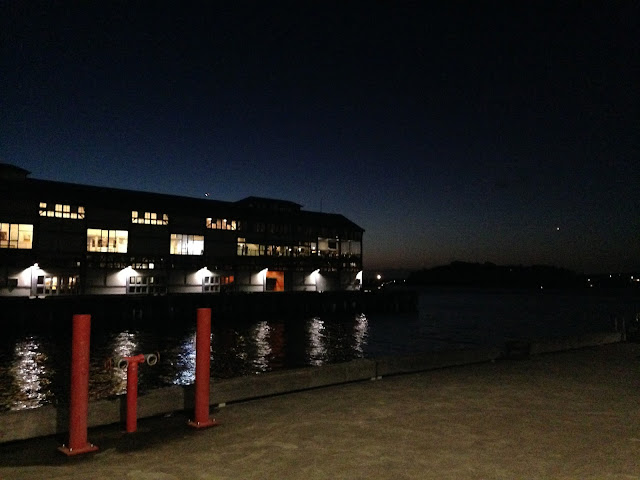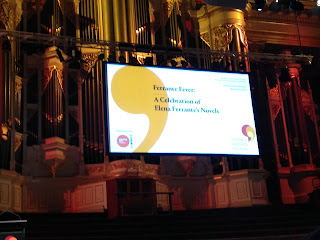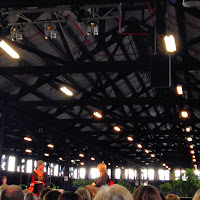My final sessions and thoughts about this year's Sydney Writer's Festival.
 |
| Town Hall, Sydney - Vivid-style |
On Friday evening, Mr Books and I went into Town Hall to hear George Saunders, Colson Whitehead, Mona Chalabi and Julia Turner discuss the topic American Carnage. The term references the point in Trump's inaugural speech when he said, 'the American carnage stops right here, right now.' The ideological divide and 'trusted' information sources being the central themes.
Sadly all four struggled to get their thoughts together and present a coherent, compelling discussion. Perhaps they were jetlagged or tired of talking about this subject or being seen as spokesmen for their entire country. But I wondered if the rather shambolic nature of this discussion also represented how muddled many Americans feel right now. Four months has not been long enough to get their heads around the new world order they are living under.
Saunders suggested the divide was like a castle. Some people imagine a castle and automatically bring to mind a Game of Thrones style castle; others see a Monty Python one.
Chalabi talked about the problems of predictive journalism and how quickly things become 'normalised'. Given they were talking at a SWF event, I would have liked more insight into how it was that Trump managed to be the one to tell the most compelling stories.
Are compelling stories simply those that tell the reader/listener what they want to hear? Or are they the stories that make the reader/listener stretch, grown and learn?
Mr Books and I shared a lively chat on the way home about the difference between Australian politics and American. It was very clear at the beginning of the talk that the Australian audience was very proud of our mandatory voting system which forces everyone to engage in the political process.
I wonder if the talk would have had more direction and structure if there had been a non-American on the panel?
Saturday morning was another glorious autumnal morning in Sydney. I only had one session booked for 3pm, but I went in a couple of hours early to soak up the atmosphere. I enjoyed a chat with a friend and a coffee in the sun before heading into one of the free events featuring Peter Polites author of Down the Hume.
Gay crime or queer noir is not my usual fare, but Polites gave me a lot of food for thought re our class system and political philosophy. He showed that rises in noir writing occurred during times of economic change. The problems of economic casualisation were explored, although he nearly lost me when he declared that 'if Henry James were alive today he would watch Real Housewives of Sydney.'
The session I was looking forward to the most was with Nadja Speigelman.
She didn't disappoint.
Speigelman is articulate, funny, generous, thoughtful, open, honest and gracious. Everything I loved about her memoir, I'm Supposed to Protect You From All This, was on display in person.
The talk was led by Abigail Ulman, who I had never come across before. However, she thoroughly impressed me with her ability to listen carefully and ask knowledgeable questions that guided the conversation naturally. She was granted a Wallace Stegner Fellowship from Stanford University and won the 2016 SMH Best Young Novelist Award. I will now be on the lookout for her story collection, Hot Little Hands.
I woke up Sunday morning feeling rather exhausted, but I pushed through the pain barrier and headed out the door.
Yet another sunny day on the harbour; more autumnal book bliss; and another coffee break whilst soaking up the glorious sunshine.
It's a hard life, but someone has to do it!
I started the morning with a panel celebration of Melina Marchetta's YA classic, Looking For Alibrandi. Can you believe it's 25 years?
The discussion was modelled on the Have a Say Day section of the book where Josie and Jacob meet. Various authors and actors had their say with Alibrandi being the central idea on which to talk. Pia Miranda hosted the panel that included Melina herself, Yassmin Abdel-Magied, Mark Di Stefano, Gen Fricker, Brodie Lancaster and Rajith Savanadasa.
Between them they covered the immigrant experience, feminism, cultural biases, guilty pleasures, embarrassment, love and the importance of seeing ourselves in stories.
My final session for the festival was one of the big ones. Lion: A Long Way Home featured Saroo and Sue Brierley talking about their experiences with adoption, being lost, then found and their journey into the book and movie world.
I have managed to avoid every single interview and review of this book and movie, yet I know all about it. I don't like feeling like my emotions are being manipulated towards a certain state. Every article or chat show seemed to have it's own angle or agenda, so I kept them all at bay.
Having the opportunity to see and hear Saroo and his adoptive mum, Sue, in person felt like the only authentic way to get their story. Naturally they have their own angles and agendas, but it's their story, and I could live with that.
Saroo honoured the three amazing women in his life. The woman he lost (& who waited for him to return one day), the woman who found him on the streets of Calcutta and helped and the woman who raised him to be the man he is today.
His journey is an incredible one and I now feel ready to watch the movie.
I have never spent so much time at one festival before.
It was exhausting, in an over-stimulated kind of way.
The rest of my experiences can be found below.
Part 3 - Public Transport Rant
Part 2 - Thursday
Part 1 - Opening Night Party
Overall, it felt like a mixed bag.
I didn't come away with a long list of new authors or new books to read like I have in previous years. But I didn't see many of the free talks this year...and that's where I have found the hidden gems in the past.
I enjoyed some of the talks - a lot.
But some left me underwhelmed.
When you can pay up to $35 for a ticket, you expect more for your buck. You expect little pearls of wisdom and surprising insights. You expect thoughtful questioning and attentive conversationalists.
I attend writer's festival to learn something new; not to be told the same stuff I already knew because I had read the book. An interviewer or moderators job is to bring out the best in their panel. This is a skill and not everyone displayed it this year.
Next festival I plan to see more of the free events to see if I can find the love again.


















































